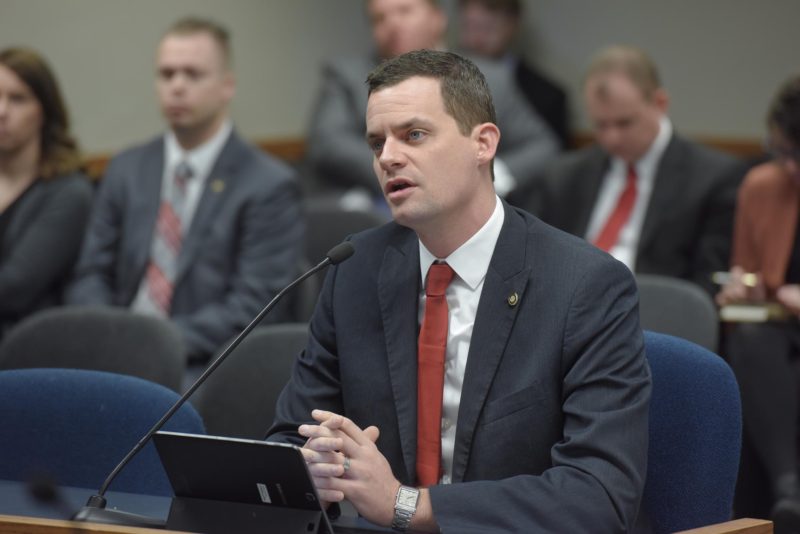JEFFERSON CITY, Mo. – The Missouri House continues to push ethics reform forward in the early days of the legislative session.
House Bill 60, sponsored by Rep. Justin Alferman, R-Hermann, was the first bill to reach committee, as the House Committee on General Laws held its first hearing on Monday, hours before the inauguration ceremony.
HB 60 proposes a ban on gifts from lobbyists to state public officials while making a few exemptions like flowers and plants, returned items and speaking fees. Alferman filed a similar bill last year, which came to a standstill in the Missouri Senate. Senators at the time wanted to limit lobbyist gifts rather than ban them.

The bill passed through the committee with ease on Monday and cleared the next hurdle, passing through the House’s Legislative Oversight Committee on Tuesday afternoon.
The committee heard no testimony on the issue, but rather went straight into executive session.
While the bill passed 11-3, several committee members expressed concern about some of the language of the bill and the process in which the bill was hurried through the first hearing on Monday.
“At 7:30 on a Monday morning, on Inauguration Day, my members were questioning what was in this bill and vetting the process as we went along,” Rep. Deb Lavender said. “It was perceived as being maybe inappropriate questioning, but I think the minority’s role is to make sure we vet the bills as best as we are able to inside of the process of where we are today.”
“On the first day of session, we were told that minority voices would be heard and respected, even though we were the super minority, and we were not allowed to make amendment, we had severely placed time limits on the amount of inquiry we could on the bill,” Rep. Michael Butler said, encouraging all of the members of the committee to vote no and send it back to the committee.
Alferman said the reasoning for such an early hearing on Monday was simply about pushing the bill through and getting started as quickly as possible.
“That was the first available day under the rules of the General Assembly that a bill could possibly be heard,” Alferman said. “That sends a very strong message to the other side of the building and to the second floor that we are going to carry through on Speaker Richardson’s promise to bring meaningful ethics reform to the state of Missouri.
Rep. Shamed Dogan also expressed some concerns about the language as it applies to caucuses.
The bill does allow exemptions to events in which the entire body has been invited, but Dogan says he’s worried about the implication of the bill which might “disallow the long-standing process of having 20 or 30 people come together and having someone talk to them” concerning issues of interest to each caucus.
Alferman says that he and Lavender have been talking to try and incorporate some of her concerns into the bill.

“I do agree with Rep. Alferman on some of these aspects; a no gifts ban would be no gifts,” Lavender said. “A lobbyist never offered me a free dinner until I became an elected official, so there has to be a reason why they do this.”
Lavender said she wants to include language that would make certain campaign funds cannot be used to reimburse lobbyists by providing a clear definition in the Missouri Ethics Commission rules.
She also says it’s important to still allow the people who come from the corners of the state to educate the lawmakers, and a provision needs to be put in place to allow for general reporting to the General Assembly in those instances.
Alferman says that the provisions would allow for such instances inside the state of Missouri, with a required 72-hour written notice.
“I’m confident that once we have a couple of amendments from the floor, I don’t anticipate any of the minority members voting no on it,” Alferman said, referring to the members of the minority in the committee. “I will say that the over-arching complaints were unfounded, but there were some constructive criticisms that were valid. Any type of criticism on this bill that is a valid step towards getting meaningful ethics reform that is helpful, I’m open to. I’m willing to take input from everyone.”
“What I am not going to tolerate is representatives trying to make cheap political points on a bill and try to obscure the passage of meaningful ethics reform simply because we have a Republican governor who is going to fight for it.”
“We are very serious about this issue this year, we are not backing down, and with a gubernatorial push, I think we are going to get it done this year,” Alferman finished.
Alferman says that once it clears the House, it will be up to the Senate. It’s still unclear who will be sponsoring it in the Senate, but Alferman says he has been talking to Sen. Caleb Rowden about the bill and expects the Senate will come through this year, as the bill seems to have the support of the majority party in the House and Senate, as well as the executive office.
Benjamin Peters was a reporter for The Missouri Times and Missouri Times Magazine and also produced the #MoLeg Podcast. He joined The Missouri Times in 2016 after working as a sports editor and TV news producer in mid-Missouri. Benjamin is a graduate of Missouri State University in Springfield.









